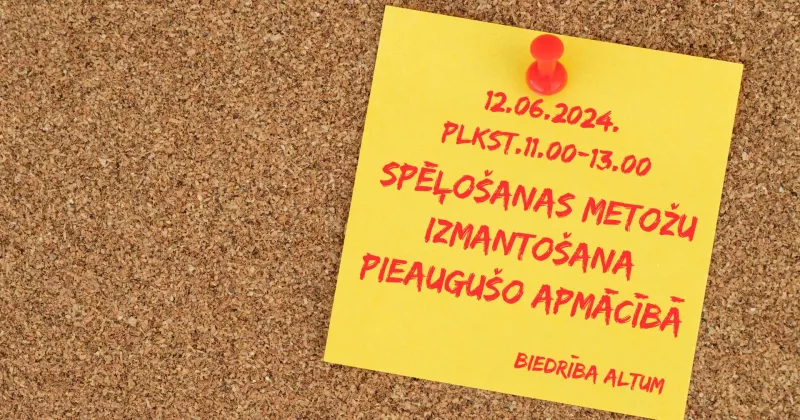Nākamā starptautiskā tiešsaistes diskusija par aktīvu novecošanu un dzīves pārejām – jau pavisam drīz

2021. gada 15. jūlijā plkst. 11.00 pēc Latvijas laika norisināsies tiešsaistes diskusija par aktīvu novecošanu un citām svarīgām dzīves pārejām. Diskusiju vadīs Džīna Ebnere (Gina Ebner) un Kristīna Cieslaka (Christin Cieslak) no Eiropas Pieaugušo izglītības asociācijas (EAEA), un viņām pievienosies arī Dina Sueiru (Dina Soeiro) un Suzanna Čeimbersa (Susannah Chambers).
EAEA pārstāvji iesaistīs Dinu un Suzannu atvērtajā diskusijā „Aktīva novecošana un citas svarīgas dzīves pārejas”. Ko īsti mēs saprotam, kad lietojam šos terminus? Kādas ir iespējas un izaicinājumi, kas varētu rasties, sagaidot vecumdienas aktīvi un piedzīvojot citas svarīgas dzīves pārmaiņas?
Tēmas
Mūsu vieslektori diskusijā runās par individuālo un Eiropas parasto praksi šajā jautājumā.
Mēs arī aplūkosim pašreizējo situāciju Eiropā un izpētīsim, vai un kā ES atbalsta aktīvas novecošanas iespējas un citas iedzīvotājiem nozīmīgas dzīves pārejas. Diskusijā galvenā uzmanība tiks pievērsta tam, lai noskaidrotu, kādus labās prakses piemērus mēs varam aizgūt, lai veicinātu aktīvu novecošanu reālistiskā, neidealizētā pasaulē, radot pēc iespējas lielāku paaudžu solidaritāti, empātiju un saskaņu Eiropas sabiedrībā.
- Ko īsti nozīmē aktīva novecošana?
- Kādi ir izaicinājumi jautājumā par svarīgām dzīves pārejām?
- Kā starppaaudžu izglītība varētu palīdzēt aktīvas novecošanas un dzīves pāreju jautājumā?
Lektori
Dina Sueiru (Dina Soeiro), Portugāles Kultūras un pastāvīgās izglītības asociācijas (APCEP) un nesen apstiprinātās EAEA valdes locekle. Dinai ir 22 gadus ilga pieredze profesores darbā Koimbras (Coimbra) Politehniskajā institūtā.
Suzanna Čeimbersa (Susannah Chambers), bijusī Mācību un darba institūta Ģimenes un starppaaudžu mācīšanas vadītāja, izglītības stratēģe, tagad – ne tikai kaislīga mūziķe, bet arī aizrautīga agile trenere Londonas biržas grupā.
Saglabājiet datumu savā kalendārā!
Diskusija norisināsies 2021. gada 15. jūlijā, sākot ar plkst. 11.00 pēc Latvijas laika. To ievadīs tiešraide, kam sekos rakstiskā diskusija, kurā savu ieguldījumu varēsiet sniegt komentāru veidā. Rakstisko diskusiju moderēs EAEA.
Sirsnīgi aicinām dalīties viedokļos, pieredzē un iniciatīvās par aktīvu novecošanu, paaudžu sadarbību un solidaritāti un citām mums visiem nozīmīgām dzīves pārejām. Komentāru sadaļa būs atvērta jau iepriekš, sākot ar 2021. gada 2. jūliju.
Lai pievienotos diskusijai, klikšķini uz pogas zemāk.
Tulkoja Daniela Diure.
Komentārs
Very true...
Donald, I love this phrase you've shared with this community...
"Yesterday’s child is today’s adult and tomorrow’s grandmother or grandfather."
Incredibly true! That's like the active ageing and life transitions equivalent of a phrase so often used in society and in Family Learning - "It takes a village to raise a child".
Active Ageing and Life Transitions
Hello,
Here is our contribution to this online discussion:
What do we mean by active ageing?
Active ageing is something that should happen throughout our lives, regardless of age. It means being able to have an active participation in society at any age, which requires conditions and opportunities to act this way. Obviously, it depends mainly on our knowledge and skills.
What is challenging about life transitions?
Life is made up of transitions that happen as the years go by. Digitalization, robotization, globalization, climate transition and migration flows increase the number of transitions we all have to face. So, currently, the challenges are much higher than those that existed a few years ago, and they also change more quickly.
So, from our point of view, the main challenges are:
- the need for updating of skills.
- the regular acquisition of new skills.
- adapting education and training systems to respond to new audiences and new skills needs.
- anticipating short- and medium-term qualification needs.
- greater involvement and responsibility of everyone (especially companies) for educational and training paths and learning outcomes.
- increasing motivation and awareness that it is important to learn throughout life, regardless of the level of education already held, age, work situation or social status.
How could Intergenerational learning help with Active Ageing and Life Transitions?
Intergenerational learning means sharing knowledge between the youngest and the oldest, which implies that everyone could teach and learn, at the same time.
Young people will be able to help older people deal with technologies in supporting the transitions that older people will have to make (between jobs, from employed to retired, etc.) and also in increasing their active ageing. Older people can teach younger people many soft skills valued today by the labour market, such as teamwork, entrepreneurial spirit, resilience, creative thinking or mastery.
Each generation has been marked by certain characteristics that, usually, are lacking in other generations. The sharing of knowledge and skills between generations will always be an asset for all generations, but for this to became a reality it is necessary to go beyond a mindset that generally discredit the skills held by the elderly (always considered obsolete) or make neglect of the lessons that young people bring with them (considered only from the perspective of their usefulness for the digital world).
Best regards,
EPALE NSS Portugal
Mutual learning...
Wonderful, Dora, how you've recognised that "...everyone could teach and learn, at the same time."
It's such a missed opportunity in adult education where we view learning of different generations as mutually exclusive, so I agree that being open to learning from other generations is essential.
How to strengthen the position of seniors?
In the past, older people were respected for their knowledge and experience. At present, due to the rapid development of technology, they rather need help from younger people.
Szeniorok
Az Aktív Időskorért Alapítvány pécsi munkája példaértékű, ajánlom a figyelmükbe.
Active ageing is a very…
Active ageing is a very important topic and it truly helps to be active. Ageing or retirement should not mean stopping everything.
Dobrý den, v jakém…
Dobrý den,
v jakém jazyce bude diskuse probíhat?
Děkuji za Odpověď.
Kateřina Pávková
jazyk diskuse
Dobrý den,
diskuse probíhá v angličtině. Zapojit se můžete napsáním komentáře v angličtině zde (Váš příspěvek na blog EPALE se zrovna perfektně hodí k tomuto tématu :)). Po diskusi hostů bude moderátor probírat vložené komentáře a diskutovat je.
Monika Smekalová, NSS Česko







The Concept and Rationale
If ageing is to be a positive experience, longer life must be accompanied by continuing opportunities for health, participation and security.
Active ageing is the process of optimizing opportunities for health,participation and security in order to enhance quality of life as people age.Active ageing applies to both individuals and
population groups. It allows people to realize their potential for physical, social, and mental
well being throughout the life course and to participate in society according to their needs,
desires and capacities, while providing them with adequate protection, security and care
when they require assistance. The word “active” refers to continuing participation in social, economic, cultural, spiritual and civic affairs, not just the ability to be physically active or to participate in the labour force. Older people who retire from work and those who are ill or live with disabilities can remain active contributors to their families, peers, communities and nations. Active ageing aims to extend healthy life expectancy and quality of life for all people as they age,
including those who are frail, disabled and in need of care. “Health” refers to physical, mental and social well being as expressed in the WHO definition of health. Thus, in an active ageing frame-
work, policies and programmes that promote mental health and social connections are
as important as those that improve physical health status.Maintaining autonomy and independence as one grows older is a key goal for both individuals and policy makers . Moreover, ageing takes place within the context of others – friends, work associates, neighbours and family members. This is why interdependence as well as intergenerational solidarity (two-way giving and receiving between individuals as well as older and younger generations) are important tenets of active ageing. Yesterday’s child is today’s adult and tomorrow’s grandmother or grandfather. The quality of life they will enjoy as grandparents depends on the risks and opportunities they experienced throughout the life course, as well as the manner in which succeeding generations provide mutual aid and support
when needed.